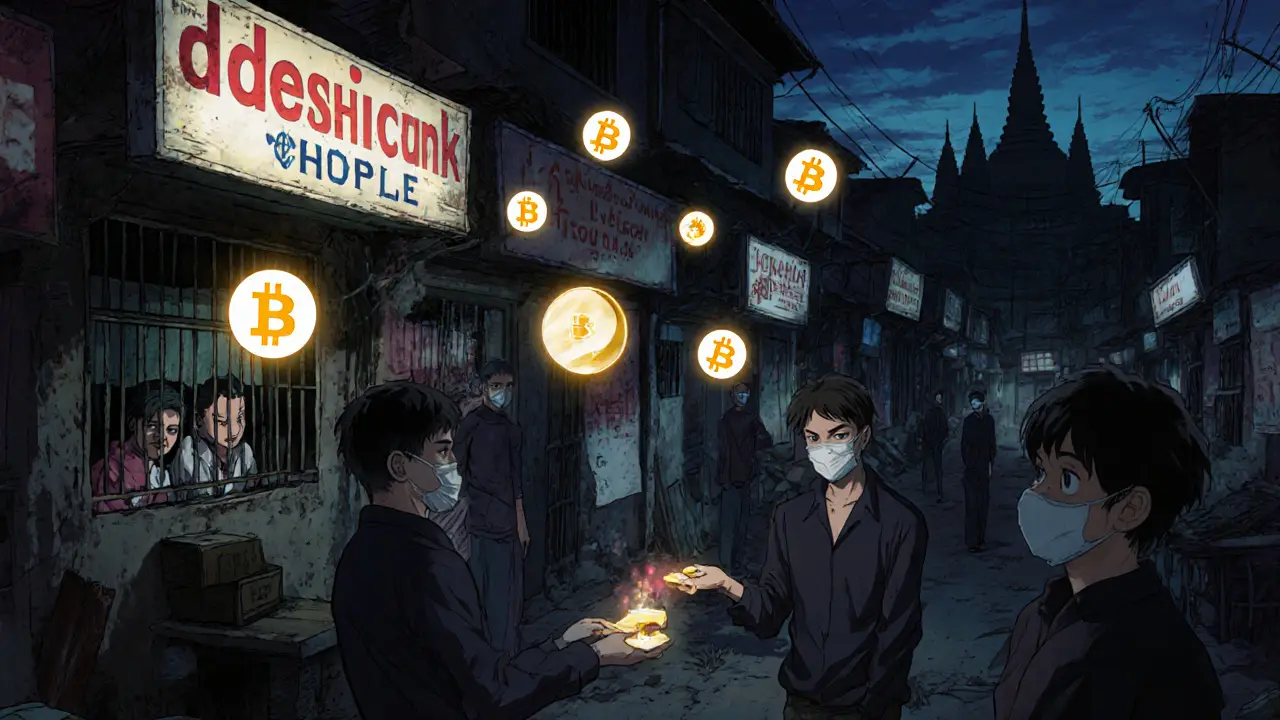Crypto Scam Risk Checker
Check if you're being targeted by a crypto scam. This tool analyzes common red flags based on the latest scam tactics reported in Cambodia's underground crypto trade.
Check Your Situation
Your Risk Assessment
On the surface, Cambodia looks like any other Southeast Asian country-busy markets, temples, and beaches. But beneath that, there’s a hidden economy worth billions, built on lies, coercion, and cryptocurrency. Since 2019, the National Bank of Cambodia has officially banned all cryptocurrency transactions. Yet, underground crypto trading didn’t disappear. It exploded.
The Ban That Made It Worse
In 2019, the National Bank of Cambodia issued Directive No. 1125, declaring that no one could legally buy, sell, or trade crypto. Banks were told to cut off any links to digital assets. At first, it seemed like a smart move. Cryptocurrency was seen as risky, unregulated, and dangerous. But instead of stopping the flow of money, the ban created a perfect storm. With no legal channels, people turned to the shadows. And in the shadows, organized crime moved in. By 2021, criminal groups had turned Cambodia into a global hub for crypto fraud. They didn’t just trade crypto-they built entire cities around it. Scam compounds, disguised as hotels and tech parks, popped up in Sihanoukville, Chrey Thom, and other coastal towns. These weren’t offices. They were prisons. Workers-many lured with fake job offers from China, Myanmar, and even the U.S.-were trafficked into these compounds. If they refused to scam people online, they were beaten. If they tried to escape, they were locked up. Their job? To convince strangers on Telegram and Facebook that they could double their money in crypto. And they did. Billions of dollars worth.Who Runs This? The Prince Group and Huione Guarantee
At the center of it all is the Prince Group. Led by Chen Zhi, this organization didn’t just run scams. It built a full criminal infrastructure. Their compounds weren’t just places to work-they were money laundering factories. Huione Guarantee, a company registered in 2014, became the financial backbone of this empire. According to Chainalysis and the U.S. Department of Justice, Huione laundered at least $4 billion between 2021 and early 2025. That’s not a typo. Four billion dollars. The money came from everywhere:- $37 million from North Korean cyber heists
- $36 million from fake crypto investment schemes
- $300 million from ransomware, dark web sales, and illegal gambling
The Global Reach: How Americans Lost $10 Billion
You might think this is a problem far away. But the victims? They’re in your neighborhood. The U.S. Department of Justice says over $10 billion was stolen from Americans in 2024 alone. Most of it came from Cambodia. Here’s how it worked: Someone gets a message on WhatsApp or Facebook: “I made $50,000 in crypto last month. Here’s my proof.” The link leads to a fake platform that looks exactly like Binance or Kucoin. They deposit $5,000. Then $10,000. Then $50,000. The platform shows their balance growing. They’re excited. They withdraw. Nothing happens. The account freezes. The person who sent the message vanishes. These aren’t random scammers. They’re employees in a factory. One worker interviewed by PANE News Lab said they worked 18-hour days, seven days a week. They had to hit daily fraud targets. Miss the target? Get slapped. Miss three? Get locked in a room with no food. The U.S. government called this “the top form of financial crime impacting Americans now and maybe ever in history.” Jacob Sims, a Harvard fellow on transnational crime, compared its profits to the global drug trade.
How They Got Away With It for So Long
Cambodia’s weak financial system made this possible. The country ranks 128th out of 180 in Transparency International’s Corruption Perceptions Index. Banks don’t ask questions. Cash flows freely. And until late 2024, there was no real oversight. Even after the 2019 ban, 10.63% of Cambodians still used crypto, according to Standard Insights’ 2025 report. That’s over 1.7 million people. Most of them didn’t know they were helping criminals. The criminals exploited every loophole:- They used Telegram to coordinate operations after their main channel was shut down in 2015
- They partnered with “illegal banks” and underground money houses that moved cash without paperwork
- They mixed crypto through multiple exchanges, making it nearly impossible to trace
- They used real businesses-casinos, hotels, restaurants-to wash the money clean
The Crackdown: $15 Billion Seized
On October 14, 2025, the U.S. Department of Justice filed a civil complaint against the Prince Group. They didn’t just accuse them-they went after everything. In a coordinated operation with the U.K. and other allies, they seized $15 billion in Bitcoin-the largest asset forfeiture in U.S. history. They froze bank accounts, shut down casinos, and raided compounds. The U.S. Treasury’s FinCEN targeted Huione directly, calling it a “one-stop crime platform.” Telegram, under pressure, shut down their last public channels. Major exchanges like Binance and Kucoin cut off all Cambodian-linked accounts. For a moment, it looked like the end. But the networks didn’t collapse. They adapted.
The New Game: A Regulated Facade
In late 2024, the National Bank of Cambodia changed its approach. Instead of banning crypto, they introduced Prakas B7-024-735 Prokor-a licensing system. Now, companies can apply for legal status. On paper, this sounds like progress. In reality, it’s a cover. Criminals are now applying for licenses. They’re setting up shell companies. They’re using legal offices to hide illegal operations. One former worker told investigators that after the new rules came out, their compound got a “business permit” and a new sign: “Golden Fortune Science and Technology.” The same people who were running scams now have business cards. The same bank accounts that moved $4 billion now have “compliance officers.” The U.S. Justice Department warned: “This regulatory shift has created a new layer of deception.”What Happens Now?
The $15 billion seizure was historic. But it’s not over. The Prince Group’s network is still active. Transactions are still flowing. The underground market is just going deeper. Cambodia’s government says it’s cleaning up. But there’s no independent audit. No public ledger. No transparency. Meanwhile, victims are still being recruited. New compounds are being built. New scams are being designed. The only real hope? Sustained international pressure. More seizures. More arrests. More cooperation between countries. Cambodia’s Central Bank Digital Currency (CBDC), first announced in 2019, could be the long-term solution. If people can use a government-backed digital currency that’s safe, fast, and legal, maybe they’ll stop turning to the shadows. But that’s years away. Until then, the underground crypto trade in Cambodia remains one of the most dangerous, profitable, and brutal financial operations on Earth.How to Protect Yourself
If you’re reading this, you probably aren’t running a scam compound. But you could still be targeted. Here’s how to stay safe:- Never trust unsolicited crypto investment offers-no matter how convincing the screenshots look
- Verify every platform-if it’s not on Binance, Coinbase, or Kraken’s official list, it’s fake
- Don’t send money to strangers-even if they say they’re “in Cambodia” and “can help you earn”
- Report suspicious messages to your local financial crime unit or the IC3 (Internet Crime Complaint Center)
- Know the signs-if someone pressures you to act fast, hides their identity, or uses only Telegram or WhatsApp, walk away
Is crypto trading legal in Cambodia?
Technically, no. The National Bank of Cambodia banned all crypto transactions in 2019. But in late 2024, they introduced a licensing system that allows some entities to operate legally. In practice, this has been exploited by criminal groups to disguise illegal crypto laundering as legitimate business. Most underground trading still happens outside the law.
How do scammers in Cambodia trick people into investing in crypto?
They use fake websites that look like Binance or Kucoin. Victims are contacted via WhatsApp, Facebook, or Telegram with stories of huge profits. Scammers show fake screenshots of rising balances. Once money is sent, the platform freezes the account or disappears entirely. Many victims lose between $5,000 and $250,000. These are not individual fraudsters-they’re employees in organized crime compounds.
Who is the Prince Group and Huione Guarantee?
The Prince Group is a transnational criminal organization based in Cambodia that runs forced-labor scam compounds. Huione Guarantee is its financial arm, responsible for laundering over $4 billion in illicit crypto funds between 2021 and 2025. Huione provided payment channels for scams, handled dark web transactions, and moved ransomware payments. Both were targeted in a major U.S. Justice Department action in October 2025.
Why did Cambodia’s crypto ban make the problem worse?
By banning crypto without providing legal alternatives, the government created a vacuum. Criminals filled it with unregulated, violent operations. Without oversight, money flowed freely through casinos, cash-based businesses, and underground banks. The 2024 licensing system didn’t fix this-it gave criminals a way to appear legitimate while continuing their illegal work.
How much money has been seized from these operations?
In October 2025, U.S. and U.K. authorities seized $15 billion in Bitcoin-the largest asset forfeiture in U.S. history. This targeted assets linked to the Prince Group and Huione Guarantee. However, experts believe this represents only a fraction of the total illicit funds still circulating in the underground market.
Are there any safe ways to invest in crypto in Cambodia?
There are no officially recognized, safe crypto exchanges operating in Cambodia. Even licensed entities under the 2024 regulatory system have been linked to criminal networks. The safest option is to avoid crypto trading entirely within Cambodia. If you must trade, use only globally regulated platforms like Coinbase or Kraken-and never send funds to local Cambodian addresses or wallets.


14 Responses
Man, this is wild. I had no idea crypto scams were this organized. My cousin got scammed last year-thought he was investing in some ‘Cambodia crypto fund.’ Lost everything. Just goes to show how slick these operations are. We need way more public awareness, not just seizures.
The structural irony here is profound: a regulatory prohibition inadvertently catalyzed the emergence of a hyper-efficient, vertically integrated transnational criminal enterprise. The ban didn’t suppress market activity-it externalized it into an unregulated, coercive, and opaque ecosystem where institutional voids became profit vectors. The Prince Group didn’t exploit a loophole-they engineered a new institutional architecture out of state failure.
This breaks my heart. People are being treated like machines, forced to lie to strangers just to survive. I hope the world doesn’t look away. There are real human beings behind every dollar lost-not just numbers on a blockchain. We have to remember that.
It’s crazy how fast this grew. One minute it’s a ban, next thing you know it’s a whole criminal economy with its own HR department. We need to stop treating this like a tech problem and start treating it like a human rights crisis. The money’s big, but the pain is bigger.
There’s something deeply sad about how hope gets weaponized here. People want to believe in easy money-so the predators give them a mirror that reflects their dreams. And when the mirror shatters, they’re left with nothing but guilt and loss. Maybe the real crime isn’t the fraud-it’s how little we do to protect the hopeful.
Bro this is straight outta a Netflix documentary 😱 And the worst part? It’s REAL. I just checked-Huione’s wallet addresses are still active on Etherscan, just routed through 7 different mixers. And guess what? Some of the ‘licensed’ Cambodian firms now? Same IPs, same admins, same Telegram groups. The ‘regulation’ is just a fancy logo on the prison gate 🏢💸. Also, if you’re reading this and thinking ‘I could make money quick’-STOP. You’re not a trader, you’re a target. I’ve seen this play out 3x in India. Same script. Different country. Same pain. 💔
Imagine working 18 hours a day, scared to breathe, just to make some rich guy in a suit look like a genius on his yacht. And they call it ‘business.’ This ain’t capitalism. This is slavery with a blockchain.
Ugh, of course Cambodia’s the hotspot. They’ve been a third-world playground for every scammer since the 90s. Why do people keep thinking these places can be trusted? 🙄
I just read this whole thing and felt sick. But I’m glad someone’s shining a light on it. Please don’t let this fade from the news. These people need help, not just headlines.
They banned crypto. Then criminals took over. Now they license criminals. Classic. Just stop trusting governments. They’re all corrupt.
It’s not just Cambodia. This is happening everywhere. The tech just makes it easier to hide. We’re all just pawns in a game we didn’t sign up for.
so like… the ban made it worse?? wait that’s not right… i thought bans were supposed to stop stuff?? 🤔 maybe i’m dumb but this is wild
Let’s be clear: this isn’t a ‘crypto problem.’ It’s a governance failure. The National Bank of Cambodia’s Directive No. 1125 was a textbook case of regulatory myopia-ignoring the elasticity of illicit demand. And now, the so-called ‘Prakas B7-024-735 Prokor’? A performative compliance theater. The U.S. DOJ’s civil complaint? A tactical victory, not a strategic one. Until you dismantle the money-laundering infrastructure-not just freeze wallets-you’re just playing whack-a-mole with organized crime.
People still believe in ‘easy money’? That’s why this works. Stupidity is the real currency here.